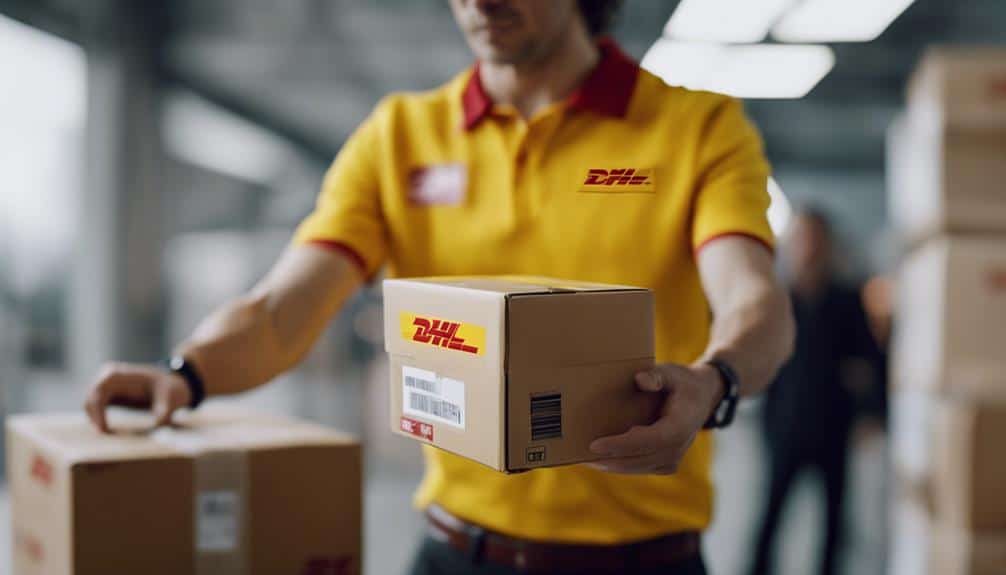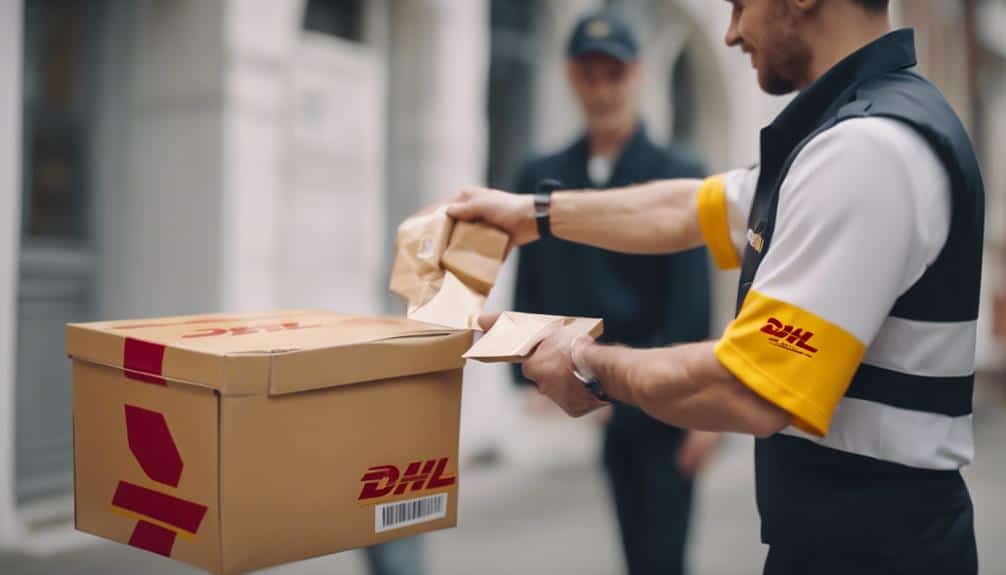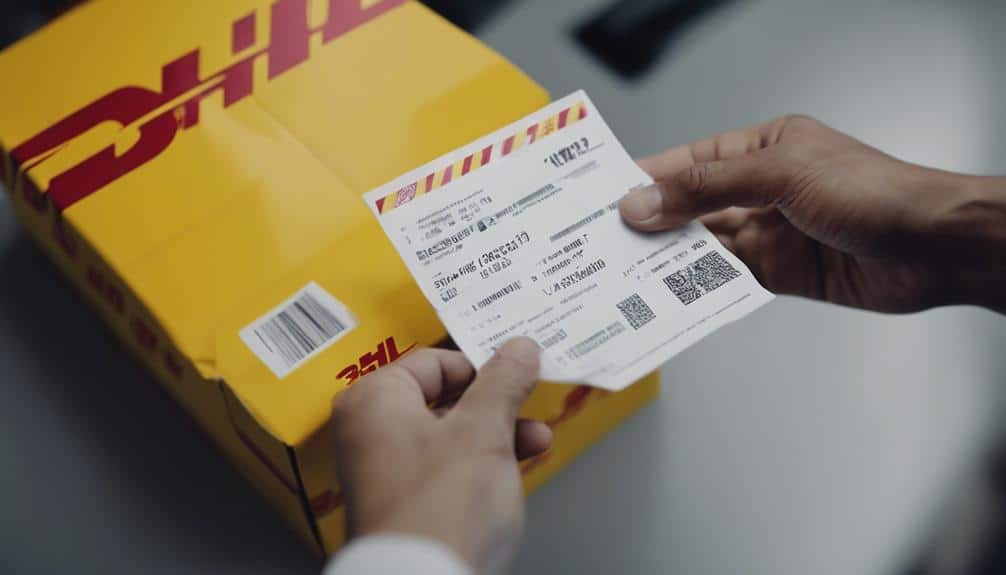When DHL packages are handed off, it signifies a change in the delivery process, impacting logistics and tracking. Third-party partnerships are utilized to enhance coverage, especially in rural areas, albeit potentially leading to minor delays. Tracking information may shift to third-party systems, necessitating customer adaptation. This hand-off guarantees that packages are still in transit towards their destination, maintaining reasonable delivery timeframes. These changes reflect strategic decisions by DHL to optimize its operational capabilities and improve the overall shipping experience for customers, revealing a more intricate web of logistics behind each parcel's journey.
Key Takeaways
- Third-party carriers receive DHL packages for delivery.
- Rural logistics may experience minor delays due to hand-offs.
- Increased coverage in rural areas due to third-party partnerships.
- Tracking information may shift to third-party systems for updates.
Impact of DHL Handoffs

When DHL hands off packages to third-party agents for final delivery, it initiates a series of logistical implications that can impact the overall delivery process.
Particularly in rural logistics, delivery expectations may need adjustment as the hand-off may introduce minor delays. While rural areas benefit from increased coverage through this forwarding process, the extended delivery network may result in longer shipping times.
Customers should be aware that tracking information might shift to the third party's system, requiring them to monitor progress through the new carrier's website.
Despite potential delays, packages are not lost but rather in transit with a different carrier, ensuring that delivery should still occur within a reasonable timeframe.
Third Party Carrier Network
The expansion of DHL's delivery network through partnerships with third-party carriers plays a pivotal role in enhancing coverage and efficiency across various regions.
Leveraging third-party logistics and carrier partnerships allows DHL to extend its reach to remote or under-served areas efficiently. By collaborating with local postal services, national couriers, and small delivery companies, DHL can guarantee that packages reach their destinations even in challenging locations.
Partnering with carriers like Amazon for locker deliveries further diversifies the delivery options available to customers. These strategic alliances not only enhance DHL's operational capabilities but also contribute to a seamless shipping experience for customers worldwide.
The network of third-party carriers complements DHL's services, creating a robust and reliable delivery ecosystem.
Tracking New Carrier Details

Exploring the intricacies of tracking new carrier details following the forwarding of DHL packages reveals vital insights into the delivery change process.
When a package is handed off to a third-party carrier by DHL, monitoring its progress becomes essential.
To track the package effectively, identifying the new carrier listed by DHL for package tracking is the initial step.
Subsequently, locating the carrier's tracking website for carrier updates is necessary.
Using the DHL tracking number on the new carrier's site facilitates monitoring the package's journey.
It is advisable to allow additional time for delivery due to the change.
In case of any concerns or lack of updates after a week, contacting DHL support for assistance is recommended.
FedEx Shipping Options
Analyzing FedEx's diverse shipping options reveals a range of services tailored to meet varying delivery needs effectively.
FedEx delivery options include overnight, 2-day, and ground services, catering to both urgent and standard delivery requirements.
For international shipping, FedEx provides reliable solutions to guarantee packages reach their destinations promptly and securely.
Customers can track their shipments at every stage, guaranteeing transparency and peace of mind throughout the delivery process.
FedEx Express is particularly well-suited for urgent international shipments, offering expedited delivery options.
Whether it's a time-sensitive document or a parcel requiring international delivery, FedEx's extensive range of shipping options makes it a trusted choice for businesses and individuals alike.
FedEx Tracking Terminology

Understanding FedEx's tracking terminology is essential for effectively monitoring and comprehending the journey of packages throughout the delivery process.
FedEx tracking provides significant insights into the status and location of parcels as they move through the shipping network.
Terms like 'At Destination Sort Facility' signify that the package has reached a sorting center, where it is prepared for final delivery based on its destination.
This terminology is common in logistics and plays an important role in tracking updates, influencing estimated delivery times.
Managing DPD Delays
To effectively address delays in DPD shipments, it is imperative to understand the common causes that can impact the timely delivery of packages.
Unexpected issues like weather, traffic, or operational challenges often lead to delays.
In such instances, DPD employs communication strategies to keep customers informed. Customers are advised to check tracking information for real-time updates and can reach out to DPD's customer service for inquiries regarding delays.
Managing customer expectations is essential during these delays, and DPD aims to provide transparency and support throughout the process.
Additionally, DPD may have compensation policies in place for significant delays, ensuring that customers are appropriately assisted and informed during any shipment setbacks.
Support & Legal Information

Support and legal information are essential components in ensuring compliance and user trust within the shipping industry.
Customer support plays a key role in addressing inquiries, tracking packages, and resolving any issues that may arise during the shipping process. Access to accurate and timely support can greatly enhance the overall customer experience.
Additionally, privacy policies are critical in safeguarding user data and maintaining transparency in data handling practices. By complying with data protection regulations and obtaining user consent for data processing activities, shipping companies can build trust with their customers and demonstrate a commitment to data privacy.
Establishing robust customer support mechanisms and implementing clear privacy policies are integral to fostering positive relationships with clients and ensuring legal compliance in the shipping industry.
Conclusion
In summary, the hand-off of DHL packages to third-party carriers is akin to a relay race, where seamless changes are vital for efficient delivery logistics.
Understanding the impact of this process, tracking new carrier details, and managing potential delays are essential for senders and recipients alike.
By delving into the intricacies of DHL's forwarding procedures, individuals can navigate the complexities of international shipping with greater insight and effectiveness.

Oliver Postman was born and raised in a small town in the Midwest, where his fascination with postage began at an early age. At just six years old, he stumbled upon a box of old stamps in his grandfather’s attic, igniting a passion that would shape his life.

